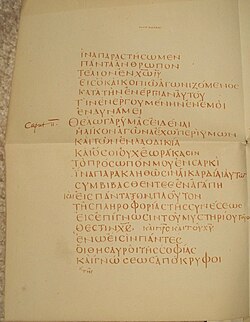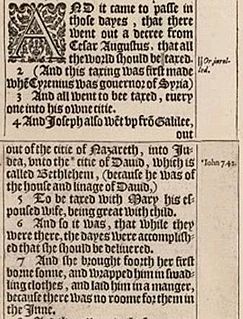
Luke 2 is the second chapter of the Gospel of Luke in the New Testament, traditionally attributed to Luke the Evangelist, a companion of Paul the Apostle on his missionary journeys. It contains an account of Jesus's birth and an incident from his childhood. Verses 1–14 are often read during services of worship on Christmas Day.

Matthew 19 is the nineteenth chapter in the Gospel of Matthew in the New Testament section of the Christian Bible. The book containing this chapter is anonymous, but early Christian tradition uniformly affirmed that Matthew composed this Gospel. Jesus commences his final journey to Jerusalem, ministering through Perea.

Ephesians 6 is the sixth chapter of the Epistle to the Ephesians in the New Testament of the Christian Bible. Traditionally, it is believed to be written by Apostle Paul while he was in prison in Rome, but more recently, it is suggested to be written between AD 80 and 100 by another writer using Paul's name and style. This chapter is a part of Paul's exhortation, with the particular section about how Christians should live in their responsibilities as households (5:21–6:9) and in the battle against spiritual forces (6:10–20), with a final benediction to close the epistle (6:21–24).
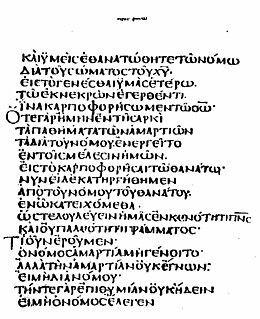
Romans 7 is the seventh chapter of the Epistle to the Romans in the New Testament of the Christian Bible. It is authored by Paul the Apostle, while he was in Corinth in the mid 50s AD, with the help of an amanuensis (secretary), Tertius, who adds his own greeting in Romans 16:22.
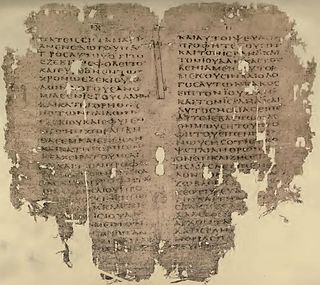
Acts 2 is the second chapter of the Acts of the Apostles in the New Testament of the Christian Bible. The book containing this chapter is anonymous but early Christian tradition affirmed that Luke composed this book as well as the Gospel of Luke. This chapter records the events on the day of Pentecost, about 10 days after the ascension of Jesus Christ.
Acts 20 is the twentieth chapter of the Acts of the Apostles in the Christian New Testament of the Bible. It records the third missionary journey of Paul the Apostle. The book containing this chapter is anonymous, but early Christian tradition uniformly affirmed that Luke the Evangelist composed this book as well as the Gospel of Luke.

Romans 12 is the twelfth chapter of the Epistle to the Romans in the New Testament of the Christian Bible. It is authored by Paul the Apostle, while he was in Corinth in the mid 50s AD, with the help of an amanuensis (secretary), Tertius, who adds his own greeting in Romans 16:22.
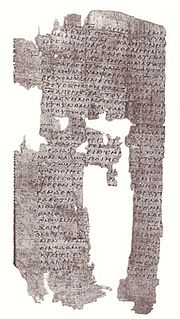
1 Corinthians 12 is the twelfth chapter of the First Epistle to the Corinthians in the New Testament of the Christian Bible. It is authored by Paul the Apostle and Sosthenes in Ephesus. In this chapter, Paul writes about spiritual gifts and the unity of the members of Christ in one body.

2 Corinthians 13 is the thirteenth and final chapter of the Second Epistle to the Corinthians in the New Testament of the Christian Bible. It is authored by Paul the Apostle and Timothy in Macedonia in 55–56 CE.

Ephesians 1 is the first chapter of the Epistle to the Ephesians in the New Testament of the Christian Bible. Traditionally, it is believed to have been written by Apostle Paul while he was in prison in Rome, but more recently, it has been suggested that it was written between AD 80 and 100 by another writer using Paul's name and style. This chapter contains the greeting, followed by a section about "The Blessing of God" and Paul's prayer.

Ephesians 2 is the second chapter of the Epistle to the Ephesians in the New Testament of the Christian Bible. Traditionally, it is believed to have been written by Apostle Paul while he was in prison in Rome, but more recently it has been suggested that it was written between AD 80 and 100 by another writer using Paul's name and style.

Ephesians 4 is the fourth chapter of the Epistle to the Ephesians in the New Testament of the Christian Bible. Traditionally, it is believed to have been written by Apostle Paul while he was in prison in Rome, but more recently, it has been suggested that it was written between AD 80 and 100 by another writer using Paul's name and style. This chapter is a part of Paul's exhortation, with the particular section about the mutual interdependence of the Christians as the church and how they should live in the world (4:17–5:20).

Ephesians 5 is the fifth chapter of the Epistle to the Ephesians in the New Testament of the Christian Bible. Traditionally, it is believed to be written by Apostle Paul while he was in prison in Rome. More recently, it is suggested to be written between AD 80 and 100 by another writer using Paul's name and style, however this theory is not widely accepted. This chapter is a part of Paul's exhortation, with the particular section about how Christians should live in the world (4:17–5:20) and in their responsibilities as households (5:21–6:9).

Colossians 1 is the first chapter of the Epistle to the Colossians in the New Testament of the Christian Bible. Traditionally, it is believed to have been written for the churches in Colossae and Laodicea by Apostle Paul, with Timothy as his co-author, while he was in prison in Ephesus, although there are debatable claims that it is the work of a secondary imitator, or that it was written in Rome. This chapter contains the greeting, thanksgiving and prayer, followed by a "Christological Hymn" and the overall thesis of the letter.

Colossians 3 is the third chapter of the Epistle to the Colossians in the New Testament of the Christian Bible. Traditionally, it is believed to have been written for the churches in Colossae and Laodicea by Apostle Paul, with Timothy as his co-author, while he was in prison in Ephesus, although there are debatable claims that it is the work of a secondary imitator, or that it was written in Rome. In the previous chapter, Paul has reminded the people that they no longer "belong to the world", but they are to live in intimate union with Christ, and this chapter contains his advice how he wants the Colossians to live.

Colossians 4 is the fourth chapter of the Epistle to the Colossians in the New Testament of the Christian Bible. Traditionally, it is believed to have been written for the churches in Colossae and Laodicea by Apostle Paul, with Timothy as his co-author, while he was in prison in Ephesus, although there are debatable claims that it is the work of a secondary imitator, or that it was written in Rome. This chapter contains the final exhortations and greetings.
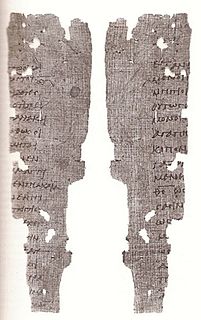
1 Thessalonians 1 is the first chapter of the First Epistle to the Thessalonians in the New Testament of the Christian Bible. It is authored by Paul the Apostle, likely written in Corinth in about 50-51 AD for the church in Thessalonica. This chapter contains the prescript and Paul's thanksgiving for the church.

Philippians 1 is the first chapter of the Epistle to the Philippians in the New Testament of the Christian Bible. It is authored by Paul the Apostle about mid-50s to early 60s AD and addressed to the Christians in Philippi, written either in Rome or Ephesus. This chapter contains the greeting, thanksgiving, prayer and exhortation as an introduction (overture) to the major narratives in the next chapters.

Philippians 3 is the third chapter of the Epistle to the Philippians in the New Testament of the Christian Bible. It is authored by Paul the Apostle, probably in the mid-50s or early 60s CE and addressed to the Christians in Philippi. This chapter contains Paul's comments and exhortations centering on a narrative about his life.

1 Peter 3 is the third chapter of the First Epistle of Peter in the New Testament of the Christian Bible. The author identifies himself as "Peter, an apostle of Jesus Christ" and the epistle is traditionally attributed to Peter the Apostle, but some writers argue that it is the work of Peter's followers in Rome between 70 and 100 CE.
